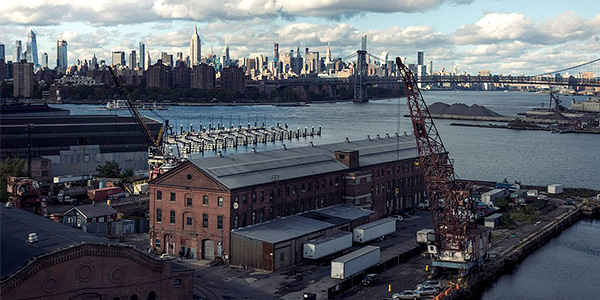By Michael Kuser
FERC on Thursday denied NYC Energy’s (NYCE) request for a limited waiver of NYISO interconnection rules for its 80-MW energy storage facility proposed to be situated on a barge moored at the Brooklyn Navy Yard.
NYCE sought waiver of a Tariff provision that requires a project to withdraw from the ISO’s interconnection queue if it fails to comply with certain interconnection procedure requirements (ER20-629).
NYCE explained that its project is a modification of a previously permitted combined cycle gas/oil-fired generating facility and that the ISO also completed a materiality review of the project regarding a change in technology in August 2019. Further, the developer said it notified NYISO of its intention to enter the 2019 class year of the interconnection queue, and the ISO acknowledged the request on Aug. 16, 2019.
In addition, NYCE said it delivered an executed facilities study agreement (FSA) to NYISO on Sept. 11, 2019, along with all other required materials, including a $100,000 FSA study deposit.
But the company noted that when it submitted the FSA, it learned that NYISO had concluded that a previous finding of no adverse environmental impacts under state law applied only to the original project, not to the newer battery project, meaning the latter did not satisfy regulatory milestones required for the queue.
NYCE withdrew its effort to join the 2019 class year but sought a Tariff waiver in order to hold a position in the queue. NYISO supported NYCE’s waiver request, saying that absent a waiver from the commission, the ISO could not accept the two-part deposit for NYCE’s project after Sept. 16, 2019.
The ISO further said it did not dispute NYCE’s assertion that no adverse harm will result to other projects if the waiver request is granted because NYCE’s project no longer sought to participate in the 2019 class year.
The commission rejected NYCE’s arguments, saying “the record reveals no reason why NYCE could not have satisfied the regulatory milestone in accordance” with NYISO’s Tariff provisions, and the company “has not adequately explained why it assumed that prior regulatory reviews for a different generating facility would satisfy the regulatory milestone in the [Tariff].”
“Specifically, although we find no evidence of ill intent by NYCE, we find that NYCE has not demonstrated that it acted in good faith,” said the order confirmed by Chairman Neil Chatterjee and Commissioner Bernard L. McNamee.
The commission also found that NYCE failed to demonstrate that its waiver request was limited in scope.
It said “a waiver is not limited in scope if the party requesting waiver does not provide a compelling reason why it should be afforded special treatment compared to others. Here, NYCE seeks to shield itself from the consequences of its choices.”
Commissioner Richard Glick dissented in a separate statement.
“First, I see nothing in the record — or today’s order — indicating that NYCE did not act in good faith,” Glick said. “After all, it does not strike me as totally unreasonable to assume that, if an oil/natural-gas fired unit can pass environmental muster, then a non-emitting battery storage facility is likely to clear that bar as well.”
Glick argued that the waiver request is limited in scope insofar as it applies only to this facility and only to this single failure to comply with the applicable deadlines, and that the request remedies a concrete problem.
“Finally, I agree with NYISO that granting the waiver would not have undesirable consequences, such as harming third parties,” Glick said. “I also understand why NYCE sought to rely on its previous environmental determinations rather than fork over an additional quarter-million dollars in collateral … [which] does not, in my view, indicate that it acted in bad faith.”




